Etichete
Arta Culinară a Sfântului Munte, Insula Ammouliani, monahul Epifanie Mylopótamitul, Sunrise Hotel

Născut în 1956 la Paggaio, în prefectura Kavala din nordul Greciei, monahul Epifanie Mylopótamitul s-a retras mai întâi la Mânăstirea Sf. Pavel din Sfântul Munte Athos, pentru ca din 1990 să-și continue viața monahală la Așezământul Sf. Eustatie (Mylopótamos), metoc al Sfintei Mânăstiri Marea Lavră. Viețuind în Sfântul Munte a avut șansa să învețe melosul bizantin de la vechi monahi aghiopavliți, dar s-a școlit și în arta culinară a Sfântului Munte devenind un adevărat simbol al ei, un maestru bucătar binecunoscut în întreaga lume.
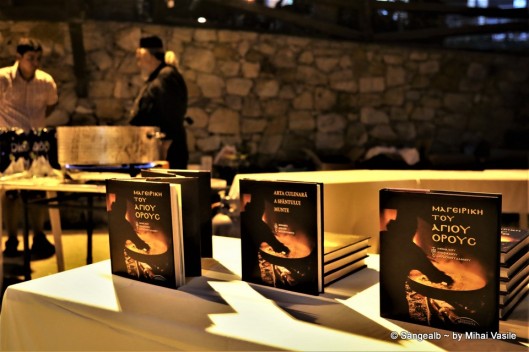 La Mylopótamos s-a ocupat de restaurarea chiliei istorice, încercând și chiar reușind să-i dea o viață nouă. În același timp, respectând tradiția milenară a locului, tradiție care coboară până în secolul al IX-lea, atunci când odată cu ridicarea Paraclisul purtând hramul Sf. Eustatie și a turnului bisericii, Sfântul Athanasios și discipolii lui au plantat viță de vie și măslini iar așezământul a fost dotat cu o presă de ulei, monahul Epifanie a plantat viță de vie și a pus pe picioare o cramă care în scurt timp a devenit cunoscută pentru celebrul vin liturgic de Mylopótamos.
La Mylopótamos s-a ocupat de restaurarea chiliei istorice, încercând și chiar reușind să-i dea o viață nouă. În același timp, respectând tradiția milenară a locului, tradiție care coboară până în secolul al IX-lea, atunci când odată cu ridicarea Paraclisul purtând hramul Sf. Eustatie și a turnului bisericii, Sfântul Athanasios și discipolii lui au plantat viță de vie și măslini iar așezământul a fost dotat cu o presă de ulei, monahul Epifanie a plantat viță de vie și a pus pe picioare o cramă care în scurt timp a devenit cunoscută pentru celebrul vin liturgic de Mylopótamos.
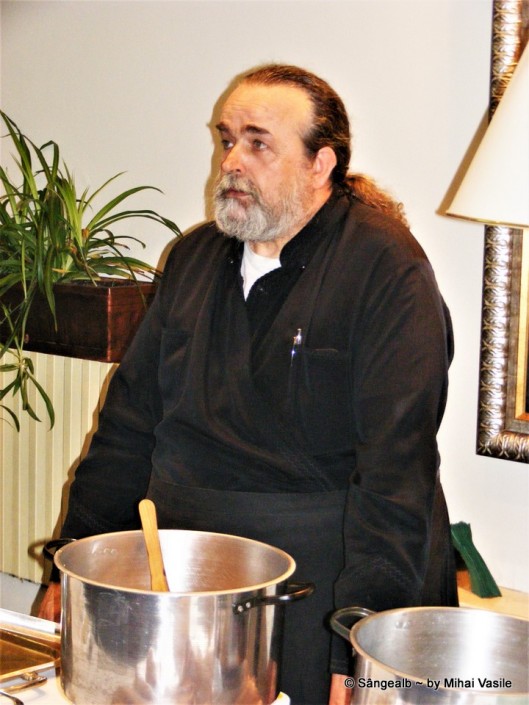
Monahul Epifanie, București, 2010
Pe lângă vin, cartea „Arta culinară a Sfântului Munte” întregește munca de o viață a monahului, aducând mai aproape de omul de rând dornic să cunoască lumea în care trăiește, viața, pe alocuri misterioasă, de pe această fâșie de pământ care intră adânc în Marea Egee numită Sfântul Munte Athos.
Nici nu mi-aș fi închipuit, în anul 2010, atunci când l-am văzut pentru prima oară în România pe călugărul Epifanie preparând o mâncare specifică Sfântului Munte Athos, că drumurile noastre se vor împleti și că odată vom sta la aceiași masă ascultându-i povestirile cu sufletul la gură, precum nu mi-aș fi închipuit că mă voi împrieteni cu Nikitas și cu Kaiti… buni prieteni cu părintele! Și uite așa s-a închis cercul…
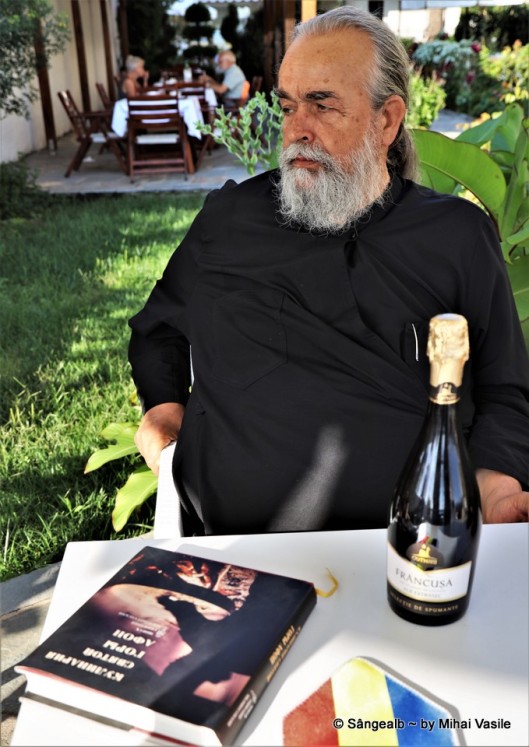
Monahul Epifanie, Ammouliani, 2019
În Ammouliani alegeam să ajungem în zilele în care insula era în sărbătoare. Turiștilor veniți întâmplător pe acolo nu le venea să creadă că pot participa la eveniment. Cu toate acestea, la mesele întinse, fie pe platoul central, fie în port, oricine putea să sărbătorească împreună cu localnicii. Așa s-a întâmplat și la „Sărbătoarea Sardelelor”, pe 15 septembrie 2019. Pescarii, pentru că majoritatea locuitorilor insulei se ocupă și cu pescuitul, mulțumeau astfel lui Dumnezeu pentru că avuseseră un an bun în care din munca lor au putut să-și întrețină familia. La festivitate invitat principal a fost călugărul Epifanie, nu să stea în capul mesei, ci să pregătească mâncare pentru toți oaspeții; și au fost peste 800, cu toate că insula are doar vreo 5-600 de locuitori permanenți!
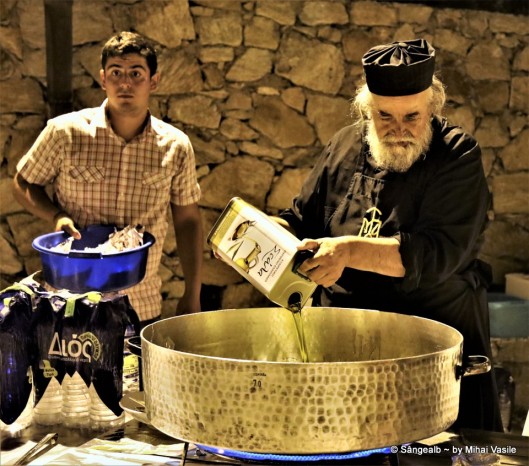 L-am urmărit atent pe monahul Epifanie cum pregătea o mâncare tradițională cu orez cu fructe de mare. Ceaunul nu părea foarte mare iar cei dornici să guste parcă nu se mai opreau din venit! Am rămas uimit atunci când am văzut că a pus în mâncarea care fierbea pe foc, 5 litri de ulei de măsline! Citisem mai multe rețete din cartea mai sus amintită și la fiecare mâncare cantitatea de ulei prevăzută era foarte mare. Dar de aici și până la a turna uleiul dintr-un bidon era cale lungă, credeam eu…
L-am urmărit atent pe monahul Epifanie cum pregătea o mâncare tradițională cu orez cu fructe de mare. Ceaunul nu părea foarte mare iar cei dornici să guste parcă nu se mai opreau din venit! Am rămas uimit atunci când am văzut că a pus în mâncarea care fierbea pe foc, 5 litri de ulei de măsline! Citisem mai multe rețete din cartea mai sus amintită și la fiecare mâncare cantitatea de ulei prevăzută era foarte mare. Dar de aici și până la a turna uleiul dintr-un bidon era cale lungă, credeam eu…
Mâncarea preparată, excelentă, gustoasă și sățioasă mi-a amintit de aceea de la Schitul Prodromu care, cu toate că părea puțină, îți ținea de foame o zi întreagă.
A fost o seară de neuitat!
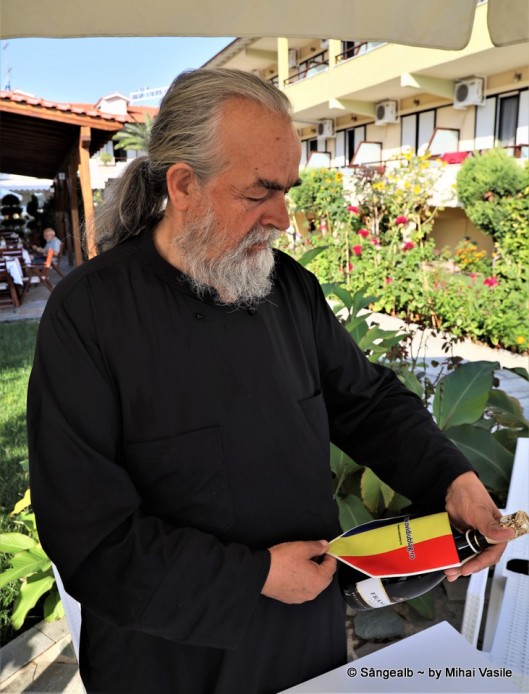 A doua zi am avut plăcerea să stau din nou de vorbă cu părintele Epifanie în frumoasa grădină a hotelului Sunrise, locul unde suntem primiți totdeauna cu brațele deschise. Gazdă primitoare și translator desăvârșit ne-a fost doamna Eleni Tsakni. Ne-am exprimat părerea de rău că părintele nu a putut să vină la Salonul de Vinuri „VINVEST” unde fusese invitat de doamna Lucia Pîrvu, directoarea salonului, dar și bucuria că scrierea despre „Arta culinară a Sfântului Munte” a fost atunci foarte bine primită de vizitatori.
A doua zi am avut plăcerea să stau din nou de vorbă cu părintele Epifanie în frumoasa grădină a hotelului Sunrise, locul unde suntem primiți totdeauna cu brațele deschise. Gazdă primitoare și translator desăvârșit ne-a fost doamna Eleni Tsakni. Ne-am exprimat părerea de rău că părintele nu a putut să vină la Salonul de Vinuri „VINVEST” unde fusese invitat de doamna Lucia Pîrvu, directoarea salonului, dar și bucuria că scrierea despre „Arta culinară a Sfântului Munte” a fost atunci foarte bine primită de vizitatori.
Sfântul Apostol Pavel spune că slujitorii Domnului trebuie să fie vrednici a-i învăța pe alții, să fie buni chivernisitori sau gospodari, dar și ospitalieri. Așadar, ospitalitatea, ca parte din misiunea Bisericii, trebuie cultivată. Este ceea ce ne îndeamnă, printre altele, monahul Epifanie în interviul pe care ni l-a acordat in exclusivitate.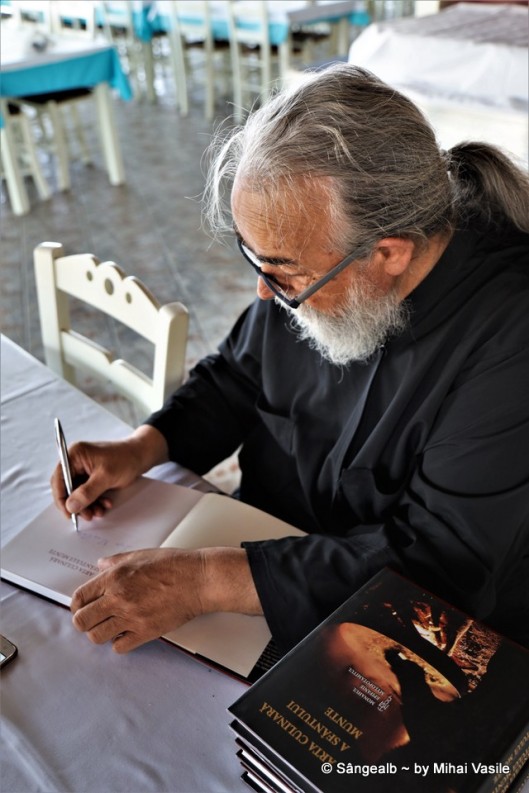
Ospitalitatea trebuie cultivată – convorbire cu monahul Epifanie Mylopótamitul
- Pentru ce cartea dumneavoastră, „Arta culinară a Sfântului Munte”, un adevărat bestseller, este deosebită? De ce românii, alături de alte sute de mii de cititori ar trebui să vă citească?
- Nu numai pentru români este importantă. Cartea vorbește despre cultura ortodoxă pentru că și gastronomia Sfântului Munte face parte din această cultură. Sunt sigur că, ortodocși fiind și voi, românii, vă dați seama de importanța postului, de însemnătatea unor preparate foarte sănătoase, cum sunt cele mediteraneene. Cu toate acestea și în țări catolice cartea a avut o primire foarte frumoasă.
- Cum ați ajuns la ideea să o scrieți?
- Sunt 12 ani de când cartea se află în librării. Pasionat de bucătărie, am adunat de-a lungul anilor, rețete de la înaintașii mei și, dorind ca acestea să se transmită peste ani și în formă scrisă, nu numai din gură în gură, le-am pus pe hârtie. Una dintre aceste rețete am făcut-o aseară și, din câte am văzut, a fost foarte bine primită!
- În magazinul Prikonisos din Ammouliani – și nu numai acolo – am văzut cartea dumneavoastră publicată în mai multe limbi străine…
- Da, publicată inițial în limba greacă se găsește acum și în română, engleză, germană, italiană, bulgară și rusă, aproape de finalizare fiind și edițiile în limba spaniolă și franceză. Astfel, volumul a ajuns până astăzi la câteva sute de mii de exemplare tipărite și vândute.
- Paradoxal „Arta culinară… ” este un îndemn la cumpătare…
- Parfumurile bune se țin în flacoane mici…
- Deși sărbătoarea de aseară s-a numit „a sardelelor”, ea a fost de fapt una a spiritului…
- Acesta trebuie să fie spiritul unei sărbători. Să apropie oamenii, amintind de munca lor prin discuții, prin muzică și nu în ultimul rând prin mâncare. Ceea ce s-a întâmplat și ieri, așa cum ați văzut. Viața fără sărbătoare și mai ales fără sărbătoare spirituală este ca drumul lung fără opriri! Și în Biblie se spune: lucrăm 6 zile și a 7-a ne odihnim, ne relaxăm.
- Ce mesaje ați vrea să transmiteți pentru cititorii dumneavoastră din România?
- Să ținem aproape, să muncim, să fim prieteni, să ne bucurăm de viață cu moderație.
Firește, am mai fi avut multe de povestit. Cu binecuvântarea monahului Epifanie Mylopotamitul a rămas să vorbim la o viitoare întâlnire, poate chiar în România, unde-l așteaptă numeroși cititori și iubitori ai gastronomiei athonite, despre vinul făcut sub îndrumarea dânsului la Schitul Mylópotamos, dar și despre virtuțile uleiul lor de măsline. (Mihai Vasile, Emil Stanciu)
PS: Din păcate, întâlnirea stabilită în acea zi de septembrie 2019 nu a mai avut loc. În dimineața zilei de 11 decembrie 2020, părintele Epifanie Mylopotamitul a plecat la Domnul. Bunul Dumnezeu să-l odihnească în pace!
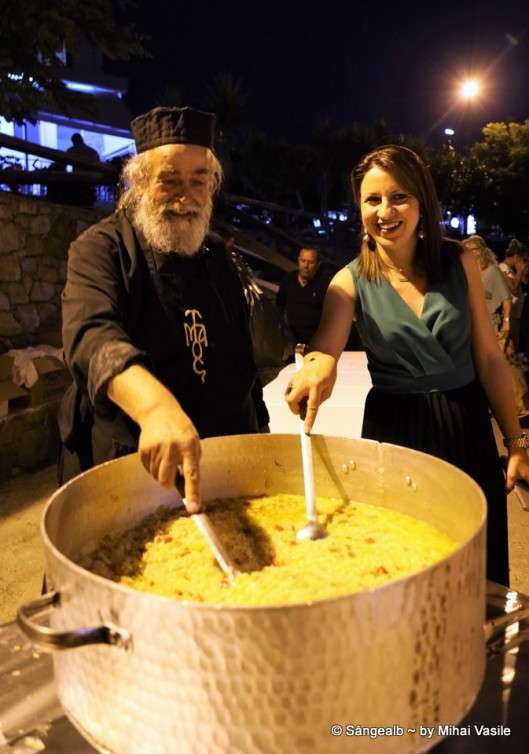
From the Byzantine melos to the gastronomy of the Holy Mount Athos
Born in 1956 in Paggaio, in the prefecture of Kavala in northern Greece, Monk Epiphanius the Mylopótamite first retired to the Monastery of St. Paul in the Holy Mount Athos, and then continued his monastic life in the Settlement of St. Eustatius (Mylopótamos), metoc of the Holy Monastery the Great Lavra.
Living on the Holy Mountain, not only did he have the chance to learn the Byzantine melos from ancient Agiopavli monks, but he also trained in the culinary art of the Holy Mountain, thus becoming a true symbol, a master chef well known throughout the world.
At Mylopótamos he took on an active role in the restoration of the historic cell, trying and even succeeding in giving it a new life. At the same time, respecting the millennial tradition of the place – a tradition that dates back to the 9th century, when with the erection of the Chapel dedicated to St. Eustatius and the church tower, St. Athanasius and his disciples planted vines and olive trees and the settlement was equipped with an oil press – the monk Epiphanius planted vines and set up a winery that soon became known for the famous liturgical wine of Mylopótamos.
In addition to wine, the book „Culinary Art of the Holy Mountain” completes the monk’s work of a lifetime, bringing closer to the commoner eager to know the world in which he lives, the life, sometimes mysterious, from this strip of land that goes deep into the Aegean Sea called the Holy Mount Athos.
I would have never imagined in 2010, when I first saw Father Epiphanius in Romania preparing a traditional dish from the Holy Mount Athos, that our paths would cross again and that once we sat at the same table listening to mouth-watering stories, I would befriend Nikitas and Kaiti… good friends of father Epiphanius! And that’s how the circle closed…
In Ammouliani we chose to arrive on the days when the island was in celebration. Tourists who got there by chance were unaware of the fact that they could participate in the event. However, at large tables, either on the central plateau or in the harbor, anyone could celebrate with the locals. The same happened at the „Feast of Sardines” on September 15, 2019. The fishermen, because most of the inhabitants of the island also deal with fishing, thanked God for the good year in which they were able to provide for their families. The chief guest present at the feast was Monk Epiphanius, but he was not there to be seated at the head of the table, but to prepare the food for all the guests. And there were over 800, although the island has only about 500-600 permanent inhabitants!
I carefully watched Monk Epiphanius as he prepared a traditional meal with rice and seafood. The cauldron did not look very big, and those eager to taste kept coming and coming! I was amazed to see how he poured 5 liters of olive oil in the food that was boiling over the fire! I had read several recipes from the aforementioned book and the amount of oil provided for each meal was, indeed, very high. But from this to pouring the oil from a can was a long way, I was thinking to myself…
The excellently prepared, delicious, and filling food reminded me of that from the Prodromu Hermitage, which, although seemingly small in quantity, was enough to keep you going for the whole day.
It was an unforgettable evening!
The next day we had the pleasure of talking again with Father Epiphany in the beautiful garden of the Sunrise Hotel, the place where we are always welcomed with open arms. Mrs. Eleni Tsakni was our welcoming host and perfect translator.
We expressed our regret that the father could not attend the Wine Salon „VINVEST”, where he was invited by Mrs. Lucia Pîrvu, director of the salon, yet we were extremely happy to see the „Culinary Art of the Holy Mountain” was very well received by the visitors.
The Holy Apostle Paul says that the servants of the Lord must be worthy of teaching others, good stewards, as well as hospitable. Therefore, hospitality as part of the Church’s mission must be cultivated. This is what the monk Epiphany urged us, among other things, in the interview he gave us exclusively.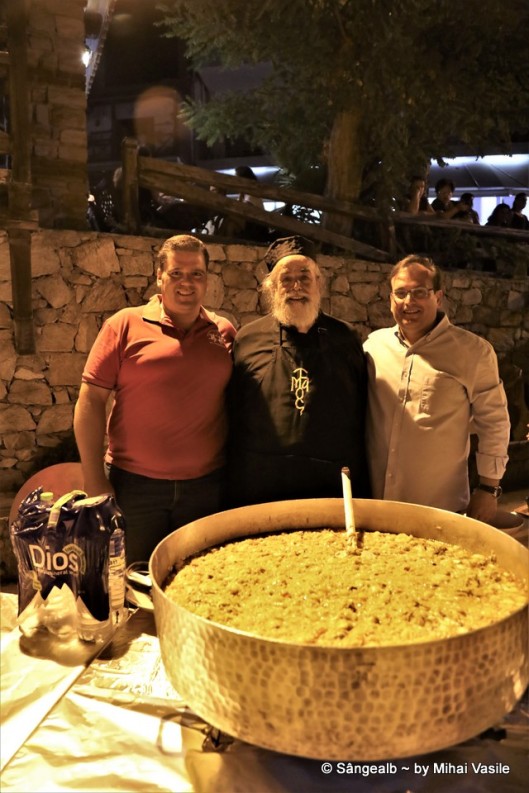
Hospitality must be cultivated – a conversation with the monk Epiphanius Mylopótamite
- Why is your book „The Culinary Art of the Holy Mountain” a true bestseller? Why should Romanians, along with hundreds of thousands of other readers, read you?
- The book is important not only for Romanians. It talks about the Orthodox culture because the gastronomy of the Holy Mountain is part of this culture. I am sure that, being Orthodox, Romanians also realize the importance of fasting, the significance of healthy dishes, such as the Mediterranean ones. However, even in Catholic countries the book was very well received.
- How did you come up with the idea of writing this book?● It’s been 12 years since the book was in bookstores. Passionate about cooking, I have collected over the years recipes from my predecessors and, as I wanted them to be passed on not only by word of mouth but also in written form, I put them on paper. It was one of these recipes that I used last night and, from what I saw, it was very well received!
- In the Prikonisos store in Ammouliani – and not only there – I saw your book published in several foreign languages…
- Yes, originally published in Greek, it is now available in Romanian, English, German, Italian, Bulgarian and Russian, and the Spanish and French editions are nearing completion. Thus, the volume has reached to this day several hundred thousand copies printed and sold.
- Paradoxically, „Culinary Art …” is an exhortation to restraint…
- Good perfumes are kept in small bottles…
- Although last night’s party was called „Feast of Sardines”, it was actually one of the spirits.
- This must be the spirit of a holiday. To bring people closer, remembering their work through discussions, through music, and last but not least, through food. Which actually happened yesterday, as you saw. Life without celebration and especially without a spiritual celebration is like the long road without stops! And the Bible says: we work 6 days and on the 7th we rest, we relax.
- What messages would you like to send to your readers in Romania?
- Let’s stay close, let’s work, let’s be friends, let’s enjoy life in moderation. Naturally, there was so much more we would have liked to talk about… But with the blessing of the monk Epiphanius the Mylopótamite, we agreed on a future meeting, perhaps even in Romania, where a lot of readers and lovers of the Athonite gastronomy are waiting for him to tell them about the wine made under his guidance at the Mylópotamos Hermitage, and the virtues of their olive oil.
-
PS: Unfortunately, the meeting set in that day in September 2019 did not take place. On the morning of December 11, 2020, Father Epiphanie the Mylopotamite left for the Lord. Good God rest him in peace!
-
Mulțumesc prietenului dr. Thomas Csinta pentru găzduirea acestui articol în paginile prestigioasei sale publicații, Jurnalul Bucureștiului.
